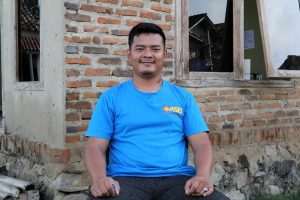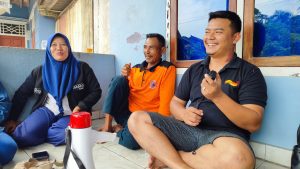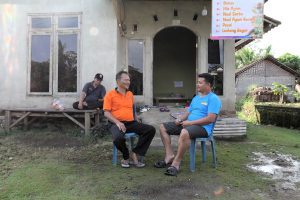In the quiet village of Sukabanjar, nestled in the lowlands of South Lampung district, the rhythm of life is shaped by the land and the seasons. But beneath its calm surface, the village carries scars of recurring floods, scars that became deeply personal for a young man named Eep Suhada.
Eep wasn’t always the face of disaster preparedness in his village. In fact, just a few years ago, he stood on the other side. He was confused, powerless, and devastated as floodwaters swallowed parts of his community in 2022. “I didn’t have the knowledge. I didn’t know what to do,” he said, recalling the helplessness of watching both people and possessions swept away by the torrent. Like many villagers, Eep simply waited for the water to rise and reacted when it was already too late.
But something shifted after that flood. It was a small, quiet determination: never again.
A Turning Point
In 2024, Eep received an invitation to attend a training by ASB S-SEA (Arbeiter-Samariter-Bund South and South-East Asia) under the PASTI II programme that is funded by Aktion Deutschland Hilft (ADH), aimed at building local disaster resilience. He wasn’t invited as a disaster responder, at least not yet. He was chosen to represent Karang Taruna, the local youth group. “I came because I was told to,” Eep admitted with a chuckle. “I didn’t even know what ASB was. I just showed up.”
What he found at the training wasn’t what he expected. It wasn’t just a classroom of lectures or passive listening. It was a vibrant, inclusive space of exchange. There were young people, village officials, women’s groups, and something Eep had never seen before, that persons with disabilities participating as equals.
At first, Eep was taken aback. “I was surprised, there were so many people with different abilities. I used to think they were the ones we needed to help. I didn’t realize they could be part of the solution.”
This was his first lesson: that resilience is everyone’s business.
The Power of Preparedness
One concept from the training stood out: AMPD—Aksi Merespon Peringatan Dini, or Anticipatory Action. It was a mouthful at first, and Eep confessed that he was confused when he first heard it. But as the facilitators broke it down, a lightbulb went off. “We always used to wait until the flood was already here. Only then would we act. But AMPD taught us to act before it happens.”
That shift, from reaction to anticipation, became the foundation of Eep’s transformation.
As the training continued, Eep became more involved. He participated in simulations, helped develop village-level early response protocols, and later joined a regional workshop to become a facilitator. It was here, working alongside people from across the region, including those with hearing, mobility, and visual disability—that Eep found his calling.
“I learned not just how to respond to disasters, but how to work with others, especially those I used to underestimate. I saw how people with disabilities contributed ideas, spoke up, and even led discussions. That really opened my eyes.”
From Learner to (Future) Leader
By 2025, Eep had officially joined Destana, the Village Disaster Preparedness Team, as a member. It wasn’t just a title. It was a responsibility he took to heart.
Before the PASTI II programme, Eep admits that the disaster response in his village was chaotic. “Nobody thought about preparedness. When the flood came, that’s when people started running. Even Destana, as a group, didn’t know what to do until it was already happening.”
With his newfound knowledge, Eep began pushing for change. He helped coordinate drills, facilitated AMPD planning, and encouraged others to join Destana. But he also faced challenges.
“Destana is a voluntary group. It’s not easy to get people involved when they have jobs, families, or other priorities. And at first, not everyone understood why we needed to act before a disaster,” Eep explained. “So I focused on those who were already active, and together we tried to set an example.”
He also had to overcome internal doubts. “In the beginning, I wasn’t sure I could do it. I’m not a trained professional. But every time I helped someone understand AMPD, or saw someone take it seriously, I felt stronger.”
Redefining Inclusion
One of Eep’s most profound experiences came during a training session where he was partnered with participants from the deaf community. “I was nervous. I didn’t know how to communicate,” he said. But with the help of sign language interpreters and later, through basic gestures and mutual patience, he discovered something unexpected.
“They were brilliant. One of them even led a presentation. I was in awe. It made me realize how much I had underestimated them.”
This experience changed how Eep approached inclusion. He began advocating for all disaster plans to be inclusive of persons with disabilities. He also started learning to interpret basic signs and helped others in his village become more comfortable engaging with people of different abilities.
“Before ASB, we saw disability as a limitation. Now we see it as part of our community’s strength.”
Impact That Echoes
Today, Sukabanjar is different. Thanks to the efforts of Eep and his fellow trainees, the village now has a functioning early warning response system. People know what to do when alerts are issued. Children understand evacuation routes. Volunteers coordinate before the flood arrives. And the community as a whole is more connected.
“If you asked me a few years ago where we stood on disaster preparedness, I’d say zero. Now? Maybe six out of ten. We still have work to do, but it’s a huge leap.”
Eep doesn’t take credit alone. He perceives the support of ASB S-SEA facilitators that didn’t just teach, but walked with them and made sure they understood, that makes all the difference. His hope now is to scale this change beyond Sukabanjar. “We’re not the only ones who face floods. Other villages need this too. I want to share what I’ve learned, not because I know everything, but because I know what it’s like to be unprepared.”
Legacy of PASTI II
Now the programme has officially ended, but the impact will endure, because people like Eep carry it forward.
His story isn’t just one of personal growth. It’s a story of community resilience, of breaking down assumptions, and of redefining leadership. Eep Suhada proves that true change doesn’t start with perfection, it starts with willingness. The willingness to learn, to act, and to inspire others.




